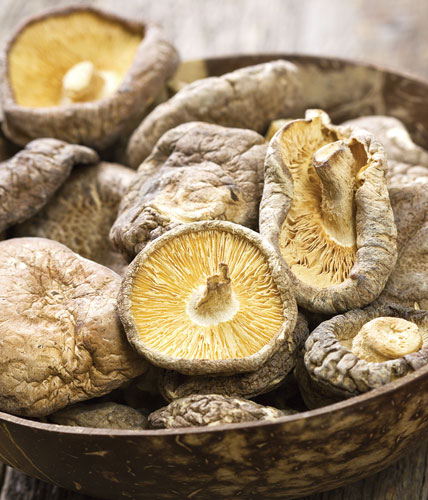Controlling Listeria in carrots; Mushrooms may boost immunity
NEWS
 Controlling Listeria in baby carrots
Controlling Listeria in baby carrots
A combination of nisin, an essential oil, and low-dose irradiation is effective at controlling Listeria monocytogenes on ready-to-eat mini carrots, according to a study published in the Journal of Food Science.
A commercial powder containing nisin—a common preservative—was used to create a stock solution, which was applied to carrots that had been inoculated with L. monocytogenes. Essential oils carvacrol and mountain savory were also applied, both alone and with the nisin solution. Each sample was irradiated at three different strength levels and stored for nine days. The researchers found that combining each of the essential oils with nisin at low-dose radiation (1kGy) effectively eliminated L. monocytogenes from the carrots, with bacterial levels undetectable by day six. The researchers conclude that these combinations offer an effective method for controlling Listeria in baby carrots.
Report predicts market changes
Retail food brands and foodservice companies—and their suppliers—will need to adjust their business strategies to respond to a changing customer base, according to a new report released by Technomic. According to Food Industry Transformation: The Next Decade, these businesses must be prepared to integrate new types of technology and be aware of emerging channels.
According to the report’s findings, more consumers will purchase groceries at nontraditional outlets, and traditional retailers such as supermarkets and supercenters will lose 10 points of market share by 2025. The groceries themselves will also evolve as manufacturers retool their supply chains to source ingredients that are good for people and the planet; successful products will not only be local and natural but will also leave a smaller carbon footprint and require less processing. On the foodservice side, large chain restaurants are expected to have sales growth at a lower rate than the 3.5% and 5% projected for independent restaurants and small chains, respectively. Growth of 7.5%, though, is projected for supermarkets, where demand for fresh prepared foods will increase substantially.
Pouches, capsules lead packaging trends
Pouches, capsules, and biodegradable options top current packaging trends, according to Lu Ann Williams, director of innovation for The Netherlands–based Innova Market Insights.
Pouches, says Williams, are popular because of the benefits they provide consumers, such as less packaging to discard, an easier way to get all of a product from the container, and resealability, ensuring freshness. In addition pouches offer a modern feel and premium look for all manner of product, from fruit purees to baby food to nuts and seeds. Capsules, meanwhile, provide convenience and a focus on sustainability. Nespresso Ecolaboration collects and recycles Nespresso coffee pods, and the Beanarella project, a joint venture between BASF, Sappi, and Innovia, offers a completely biodegradable coffee system.
Sustainability, though, says Williams, is likely not the driver behind customers’ purchases. Rather, she says that customers won’t buy from companies they perceive as wasteful. “Consumers today assume that companies are making the best use of resources; if they find out a company isn’t, that’s when you have a problem. So while it doesn’t drive purchasing decisions for the majority of consumers, it has never been more important for companies to be responsible,” she says. “The No. 1 claim by far on all food and beverage products over the past two years is some kind of ethical/responsible packaging claim. It isn’t a trend; it’s the new ground rule.”
In addition, Williams notes the marketing opportunities provided by digital printing, citing the success of Coca-Cola’s “name” cans. She also points to tins as a packaging form that isn’t necessarily mainstream but that can make a great impact, with a range of shapes and printing options available.
Sugar shown to relieve stress
According to a study that appeared in the Endocrine Society’s Journal of Clinical Endocrinology & Metabolism, sugar-sweetened beverages can suppress the hormone cortisol and stress responses in the brain. Beverages sweetened with aspartame, however, do not have the same effect.
In the parallel-arm, double-masked study, researchers assigned eight women aged 18–40 to consume one aspartame-sweetened beverage and 11 others to drink one sugar-sweetened beverage at each meal over a 12-day period. They found a diminished cortisol response during a math test in the women who drank the sugar-sweetened beverages. This group also showed more activity in the hippocampus, which is typically less active when the body is under stress.
According to one of the study’s authors, Kevin D. Laugero of the University of California, Davis, and the U.S. Dept. of Agriculture’s Agricultural Research Service, these findings help explain how sugar positively reinforces people’s temptation to eat comfort food when they are stressed. “The results suggest differences in dietary habits may explain why some people underreact to stressful situations and others overreact,” he says. “Although it may be tempting to suppress feelings of stress, a normal reaction to stress is important to good health. Research has linked over and under reactivity in neural and endocrine stress systems to poor mental and physical health.”
 Mushrooms may boost immunity
Mushrooms may boost immunity
Consuming cooked mushrooms daily may increase immunity, according to a study published in Journal of the American College of Nutrition.
In the study, researchers gave 52 participants aged 21–41 a four-week supply of dried shiitake mushrooms, which they cooked and ate at home each day in 4-ounce servings. To qualify, participants could not be vegan or vegetarian, and they could not drink tea or take antioxidant supplements or probiotics before the study. During the four weeks, they could also not consume more than 14 alcoholic beverages or more than seven servings of fruit and vegetables per day. After the experiment, participants showed better functioning gamma delta T-cells and reductions in inflammatory proteins.
Eating a shitake mushroom every day produced observable beneficial changes in the immune system, according to Sue Percival, a faculty member at the University of Florida’s Institute of Food and Agricultural Sciences. “We’re enhancing the immune system,” says Percival, “but we’re also reducing the inflammation that the immune system produces.”
What’s new with food companies
• Archer Daniels Midland will add soybean crushing capability at its plants in Enderlin, N.D., and Windsor, Canada.
• Blue Diamond Almonds Global Ingredients Division launched its first ever line of almond flour.
• ConAgra Foods acquired Blake’s All Natural Foods, a maker of natural and organic frozen meals.
• DuPont Nutrition & Health signed an agreement with Eurofins Microbiology Laboratories to provide analytical testing services as part of DuPont Detect + Protect.
• Frutarom Industries acquired a 60% stake in Indian flavors and fragrances company Sonarome.
• General Mills is planning to invest around $253 million to expand its facility in Murfreesboro, Tenn.
• Goya recently opened a new corporate headquarters, located in Jersey City, N.J.
• A roof-mounted solar energy generation system at Kalsec’s Kalamazoo, Mich., manufacturing operation will be online by the end of August 2015.
• Kansas State University opened its Bulk Solids Innovation Center, a 13,000-square-foot facility that will be used to study the science and understanding of bulk solids materials handling.
• Kellogg will expand its cereal production plant in Belleville, Canada.
• Kraft announced that Original Kraft Macaroni & Cheese in the United States will no longer be made with artificial preservatives or synthetic colors starting in January 2016.
• Nestlé USA announced that all 23 of its factories are now landfill-free.
• PepsiCo will remove aspartame from Diet Pepsi and sweeten it with sucralose and acesulfame potassium starting in August.
• Pilgrim’s Pride Corp. plans to eliminate antibiotics from 25% of its poultry production by the end of 2018.
• Tate & Lyle will exit a substantial part of its European Bulk Ingredients business and restructure its Splenda sucralose business to further focus on and strengthen Speciality Food Ingredients, including realigning its Eaststarch corn wet milling joint venture with Archer Daniels Midland in Europe.
• Tree Top won the 2015 Food Processor of the Year award in Seattle Business magazine’s Manufacturing Awards.
• Tyson plans to eliminate its use of human antibiotics in U.S. broiler chicken flocks by September 2017.
• Watson implemented lean manufacturing in its two Connecticut facilities, and it donated 360,000 nutritional supplement tablets intended for children and adults that will be distributed in the Dominican Republic.
 Melanie Zanoza Bartelme,
Melanie Zanoza Bartelme,Associate Editor
[email protected]
